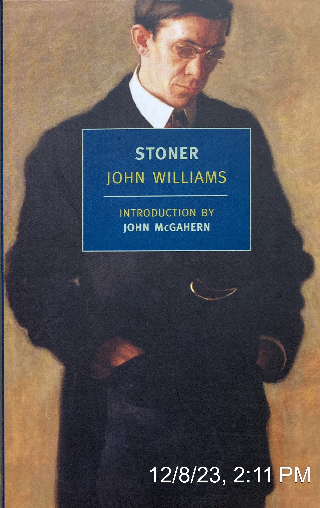-
John Williams, "Stoner"책 읽는 즐거움 2024. 2. 1. 00:05
.

John Williams, "Stoner" (1965)
아래 인용은 위 서평에서:
"And the prose was clean and quiet; and the tone a little wry. And the first page led to the second, and then what happened was that joyful internal word-of-mouth that sends a reader hurrying from one page to the next; which in turn leads to external word-of-mouth, the pressing of the book on friends, the ordering and sending of copies.
William Stoner, we learn in the book's first paragraph, was a lifelong academic, who entered the University of Missouri as a student in 1910, and went on to teach there until his death in 1956. The value and purpose of academe is a key concern of the novel, while one of its main sequences describes a long and savage piece of departmental infighting."
나도, 소설에서, 대학원생을 사이에 둔 영문학과 두 교수의 싸움("departmental infighting") 이야기가 재밌어서 그 부분을 더 읽으려고 밤 1시 반까지 책을 못 놓기도 했다. 한 가지, Stoner의 아내 Edith의 성격 유형은 나로선 잘 상상이 안 된다.
작가 John Williams(1922-1994)는 30년 가르치던 덴버대에서 1985년에 은퇴했다. John McGahern이 쓴 서두 "Introduction"을 인용하면: Williams complains about the changes in the teaching of literature and the attitude to the text "as if a novel or poem is something to be studied and understood rather than experienced." ... "Anc literature is written to be entertaining?" ... "Absolutely. My God, to read without joy is stupid."
아래는 본문에서:
"From the earliest time he could remember, William Stoner had his duties. At the age of six he milked the bony cows, slopped the pigs in the sty a few yard from the house, and gathered small eggs from a flock of spindly chickens. And even when he started attending the rural school eight miles from the farm, his day, from before dawn until after dark, was filled with work of one sort or another. At seventeen his shoulders were already beginning to stoop beneath the weight of his occupation." (p. 4)
"He wondered again at the easy, graceful manner in which the Roman lyricists accepted the fact of death, as if the nothingness they daced were a tribute of the years they had enjoyed; and he marveled at the bitterness, the terror, the barely concealed hatrid he found in some of the later Christian poets of the latin tradition when they looked to that death which promised, however vaguely, a rich and ecstatic eternity of life, as if that death and promise were a mockery that soured the days of their living." (p. 41)
"Only once did he have news of Katherine Driscoll. In the early spring of 1949 he received a circular from the press of a large eastern university; it announced the publication of Katherine's book, and gave a few words about the author.... He got a copy of the book as soon as he could. When he held it in his hands his fingers seemed to come alive; they trembled so that he could scarcely open it. He turned the first few pages and saw the dedication: 'To W. S.'" (p. 249)
'책 읽는 즐거움' 카테고리의 다른 글
Robert B. Reich, "The System" (0) 2024.02.11 Nathan Thrall, "A Day in the Life of Abed Salama" (0) 2024.02.07 Émile Zola, "Germinal" (2) 2024.01.27 Jon Fosse, "Morning and Evening" (2) 2024.01.22 Louise Erdrich, "The Night Watchman" (0) 2024.01.20